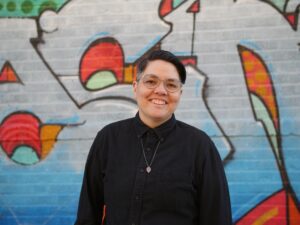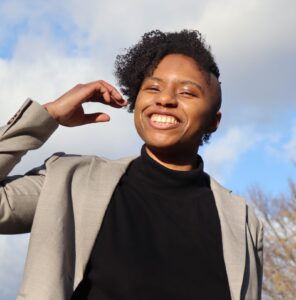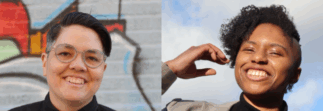Luce Capco Lincoln and Jamie McGhee have been named Women@MIT fellows for 2025. The fellowship invites scholars, activists, artists, musicians, writers, and others to showcase the Women@MIT collections in informative and engaging ways. Lincoln and McGhee will engage in archival research to create projects that contribute to greater understanding of the history of women at MIT and in the history of STEM, using the rich materials in the Department of Distinctive Collections.
“The projects of this year’s Women@MIT fellows will tell insightful stories of different trajectories of women from various backgrounds during their time at MIT. These stories bring the MIT archives to light as Lincoln and McGhee delve into our rich collections to examine and analyze historical facts,” says Emilie Songolo, head of Distinctive Collections at MIT Libraries.
 Luce Capco Lincoln
Luce Capco Lincoln
Lincoln is a Brooklyn-based filmmaker, artist, and cultural worker born in Gainesville, Florida. Their artwork and films transverse time, connecting historical stories to the present day to imagine the future. These works take form as personal documentaries, collaborative experimental films, and multimedia installations. Lincoln is co-founder of an intergenerational worker-owned media cooperative, Shadow Work Media, and an art curatorial project, Tala Arts. They studied film and video at Antioch College and hold an MFA in Film and Media Arts from Temple University.
For the Women@MIT fellowship, Lincoln will create a short creative documentary inspired by their mother’s life as a scientist and her journey immigrating to the U.S. from the Philippines at age 22 to attend MIT. A Hero’s Journey Through Time: A Collective Story (working title) will explore the institutional barriers that met women like Lincoln’s mother, highlighting multiple voices by directly referencing the oral histories and personal archives held in MIT’s collections. Lincoln will tell the personal stories of women—especially Black, Indigenous, Latines, and Asian women—working in the sciences and attending MIT to show how in each woman’s journey, there were unexpected obstacles and ultimately, perhaps, unexpected solutions.
 Jamie McGhee
Jamie McGhee
McGhee is a novelist and historian. Her books include You Mean It or You Don’t: James Baldwin’s Radical Challenge (with Adam Hollowell of Duke University) and What I Must Tell the World: The Story of Lorraine Hansberry (with director Lena Waithe). McGhee’s work has been supported by Harvard University, MIT, and Zürich University of the Arts. She lives in Berlin, where she instructs graduate students at Humboldt Universität.
McGhee’s project for the Women@MIT fellowship is Athena’s Archive, an interactive hypertext novel that blends feminist pedagogy with digital storytelling. The novel will examine the intersection of gender, technology, and academic labor through the lens of MIT’s Athena Language Learning Project (ALLP), which was developed by Janet Murray in the 1980s. Building on Murray’s work with interactive “cyberspace” narratives, Athena’s Archive will allow readers to directly engage with the challenges Murray and her female ALLP researchers faced in MIT’s male-dominated STEM environment. Through decision making, readers navigate themes such as intellectual (un)recognition and systemic marginalization.
The Women@MIT archival initiative seeks to add the records of women faculty, staff, students, and alumnae to the historic record by collecting, preserving, and sharing their life and work with MIT and global audiences. These efforts are made possible thanks to the generous support of Barbara Ostrom ‘78 and Shirley Sontheimer with the hope that this project will encourage more women and underrepresented people to become engaged in science, technology, and engineering. Extending from this initiative, Distinctive Collections also is committed to acquiring, preserving, and making accessible the papers of gender non-binary and non-conforming individuals at MIT to help share their stories and contributions. Collections, events, fellowships, and exhibits held by the Women@MIT initiative are open to all regardless of background or identity.

